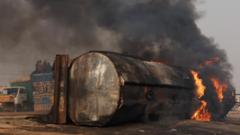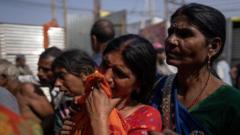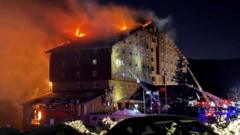On Saturday, a catastrophic fuel tanker explosion in the Suleja region of Nigeria resulted in the deaths of at least 77 individuals.
Tragic Fuel Tanker Explosion in Nigeria Claims 77 Lives

Tragic Fuel Tanker Explosion in Nigeria Claims 77 Lives
A devastating explosion in Nigeria highlights the dangers of fuel collection from crashed vehicles.
The incident unfolded when a tanker overturned, spilling its contents and igniting moments after onlookers rushed to collect fuel. Tragically, many of the deceased were attempting to gather the leaking fuel when the explosion occurred. In addition to the fatalities, at least 25 others were injured, including rescuers who arrived on the scene. The emergency management agency reported that the injured are currently being treated in local hospitals.
Such incidents are not uncommon in Nigeria, where poor road conditions and a lack of vehicle maintenance contribute to numerous fuel-related accidents. The West African nation has seen a notable rise in transportation tragedies in recent months. In a similar event just two weeks prior, another tanker explosion in Delta state resulted in the deaths of at least five people, while a more horrific incident in October claimed 153 lives as individuals attempted to scoop up leaking petrol.
The rising number of fuel tanker accidents coincides with a sharp increase in fuel prices, which have surged by over 400% in the past 18 months due to the economic reforms implemented by President Bola Tinubu. These reforms included the removal of long-standing fuel subsidies, a move intended to bolster the economy but which has plunged millions into poverty. The government maintains that these policies are necessary for economic stabilization and growth, even as many citizens are driven to dangerous and desperate measures for survival.
Such incidents are not uncommon in Nigeria, where poor road conditions and a lack of vehicle maintenance contribute to numerous fuel-related accidents. The West African nation has seen a notable rise in transportation tragedies in recent months. In a similar event just two weeks prior, another tanker explosion in Delta state resulted in the deaths of at least five people, while a more horrific incident in October claimed 153 lives as individuals attempted to scoop up leaking petrol.
The rising number of fuel tanker accidents coincides with a sharp increase in fuel prices, which have surged by over 400% in the past 18 months due to the economic reforms implemented by President Bola Tinubu. These reforms included the removal of long-standing fuel subsidies, a move intended to bolster the economy but which has plunged millions into poverty. The government maintains that these policies are necessary for economic stabilization and growth, even as many citizens are driven to dangerous and desperate measures for survival.



















